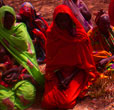Sudanese women struggle to ratify Maputo Protocol

Reflecting on progress towards the African Union (AU) Protocol to the African Charter on Human and Peoples’ Rights on Women in Africa, Sidiga Washi outlines the steps and provisions which need to be made to move forward the ratification of the protocol in Sudan.
Forty-six African governments have signed the Maputo Protocol, properly known as the Protocol to the African Charter on Human and Peoples’ Rights on Women in Africa.
The Maputo Protocol guarantees a host of rights to the continent’s women, including equality and non-discrimination on the basis of gender; protection from harmful cultural practices and domestic violence; equal pay and spousal benefits; recognition of the value of women's work in the home; and paid maternity leave.
90 million women across Africa are survivors of harmful and illegal cultural practises such as female genital mutilation. In Gambia, one of the focus countries, at least one in two Gambian women have experienced this practice. Across Africa, most poor and marginalised women are subjected daily to psychological, physical or structural violence in their places of work, homes and even among the public. In Uganda, 41 per cent of women surveyed in selected districts shared experiences of abuse and violence by their spouses, male friends or relatives. Under these conditions, a disproportionate number of women (57 per cent) are affected by HIV/AIDS, many of them young women. According to the African Union, AIDS, malaria and tuberculosis collectively erase 1–2 per cent of economic growth annually and reduce life expectancy by 25 per cent. These conditions are exacerbated by unsafe abortion and poor reproductive health services claiming 250,000 deaths per year. Whereas one in 5,000 British women have a lifetime risk of dying in childbirth, one in 25 women in many African countries will die each year.
While the required 15 member states ratified it, the coming into force of the Protocol to the African Charter on Human and Peoples’ Rights on the Rights of Women in Africa in November 2005 has seen only 29 of the continent's 53 states complete ratification to date, presenting additional opportunities. The protocol’s 21 provisions comprehensively address discrimination against women, freedom from harmful cultural practices and rights to fully participate in economic, political and social spheres. It is a ‘home grown instrument’ adopted by African governments at the highest levels following eight years of consultations.
WHY SUDAN SHOULD RATIFY THE PROTOCOL?
In Sudan, a broad spectrum of government and civil society actors are opposed to sections of the protocol.
Sudan should ratify the protocol because this protocol on the rights of women is considered to be a strong and advanced legal protection framework in comparison with existing protocols and conventions. In fact, it comprises detailed and innovative provisions on women’s rights to participate in political and decision-making processes without discrimination and be represented on an equal basis with men in all electoral processes. The protocol enacts state parties, among others, to ensure women’s rights to health and reproductive rights, including the control of fertility and access to justice and equal protection before the law. All of the above-mentioned issues are very important for Sudanese women at present, and the ratification and domestication of the provisions of the protocol will help eliminate discriminatory laws based on a person’s sex, will help protect the rights of women in Sudan and will enable Sudan to demonstrate a lead in protecting women’s rights, improved maternal health services and a reduction in early marriages, harmful traditional practices and female school drop-outs.
WHY THE DELAY IN RATIFYING IT?
Some provisions of the protocol such as the issue of equality, equality before the law and in inheritance, and control of fertility are still debatable among legislators, religious leaders and policy makers. Even some women groups have some reservations. Equality per se is even seen by some religious fundamentalists as oppositional to Islam, though Islam has given women lots of rights which were not given before and do not contradict living in dignity and enjoying their rights.
HOW DOES THE DELAY AFFECT THE STATUS OF WOMEN?
The delay will affect the progress achieved by Sudanese women organisations working to promote women’s rights and protecting gains realised in terms of reproductive health rights, ending legal discrimination and violence against women.
WHAT IS NEEDED?
What is needed?:
- To reach out to various stakeholders and mobilise their support for the ratification of the protocol and forge linkages with efforts in other African countries
- To coordinate plans for government-based activities to secure commitment for ratification and sustain dialogue with government officials
- A compilation of information on progress, outcomes and challenges being experienced in other countries for the promotion and protection of African women’s rights
- Advocacy actions geared at influencing government to speed up the ratification of the women’s protocol
- Through direct communications with head of state and key officials, place emphasis on domestication
- Increasing the number of women organisations using the AU protocol as a framework for the promotion and protection of the rights of poor and marginalised women
- Facilitation for national members to participate in the ongoing continental advocacy campaign
- Participation in country-level events bringing continental advocacy actions down to the country level
- For the purposes of wider coverage, the dissemination and sharing of the work of the national campaigns at the continental level and internationally.
BROUGHT TO YOU BY PAMBAZUKA NEWS
* Sidiga Washi is a professor of family and consumer sciences/community nutrition, currently working as a professor of community nutrition at the Department of Nutrition and Health, College of Food and Agriculture, United Arab Emirates University.
* Please send comments to [email protected] or comment online at Pambazuka News.

